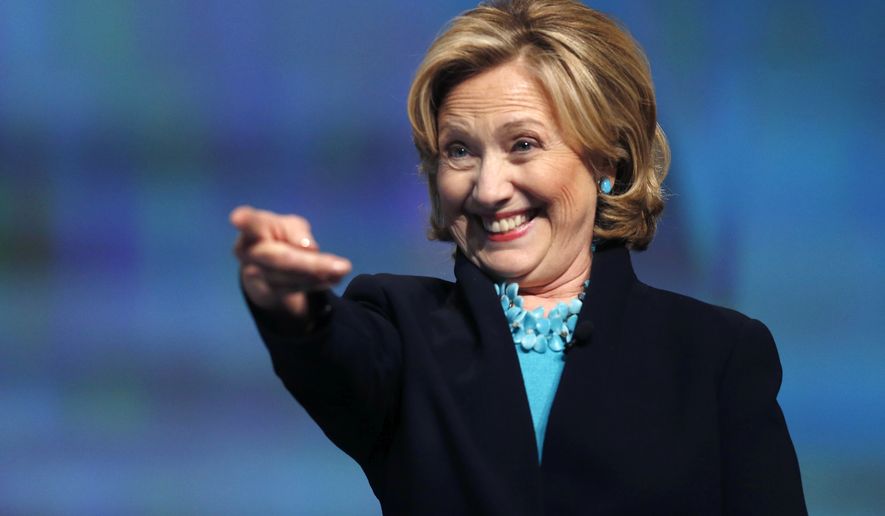OPINION:
Hillary Clinton angrily condemned the bleakest results of Barack Obama’s economy in a recent speech, but didn’t dare say who was responsible for them.
“What would Robert Kennedy say about the fact that still, today, more than 16 million children live in poverty in the richest nation on earth,” she said in an address to an elite, well-fed crowd in a Manhattan ballroom at an awards gala to honor the slain Democratic presidential candidate.
“What would he say about the fact that such a large portion of economic gains have gone to such a small portion of our population,” she continued, and so little to poor minorities that make up the core of the Democrats’ liberal political base.
Fearing a left-wing cabal is building a campaign to draft Sen. Elizabeth Warren of Massachusetts for the presidential nomination, Mrs. Clinton is retooling her message to reconnect with a party that may be turning against her candidacy.
Other presidential hopefuls are waiting in the wings to challenge her in the party primaries: Maryland Gov. Martin O’Malley, former Sen. James Webb of Virginia, Sen. Bernard Sanders of Vermont, a socialist, and maybe more to come.
Mrs. Clinton’s fiery address was filled with ultrademagogic appeals to nearly every party interest group that could be up for grabs if Ms. Warren gets into the race.
“What would Robert Kennedy say to the thousands of Americans marching in our streets with their eyes open and their hands up?” was one of the lines she used in an effort to rebuild the Clintons’ claim on the presidency.
Her racially tinged, class-warfare rhetoric represented a double-edged sword, though. If poverty remains at unacceptable levels after six years of a Democratic administration, who’s fault is that?
Mrs. Clinton seemed content to let the economic facts speak for themselves, suggesting she would pursue a different policy that would lift the poor and the middle class — the people President Obama’s economic policies have left behind.
Actually, Mrs. Clinton left out poverty figures that were much worse than the narrower numbers she used in her speech.
Nearly five years after the Great Recession supposedly ended, close to 49 million Americans, nearly 16 percent of the U.S. population, were below the poverty line, the Census Bureau reported in September.
“Neither the number nor the [percentage] rate for 2013 was statistically different from 2012,” the census report said.
While poverty declined a bit in a few states, most of the poor saw no improvement under the administration’s policies.
“Between 2012 and 2013, the number of people in poverty in 42 states and the District of Columbia remained statistically unchanged,” the Census Bureau said.
Meantime, household income has been on the decline, even in this so-called recovery, and hourly wages remain flat for most Americans. A worker’s typical pay scale is now said to be at the same real level that it was 48 years ago.
“We’ve had [economic] growth, but it hasn’t really reached everyday Americans,” said Elise Gould, an economist at the Economic Policy Institute. “It’s a lost decade, maybe more.”
If anyone thinks for a moment that Hillary Clinton has the answers to the economic issues she is exploiting for her own political advancement, forget it — for two very big reasons.
First, she is an unreconstructed liberal who is tied to Mr. Obama’s domestic policies, which she has supported since Day One: Obamacare, climate change regulations, the economic job stimulus, normalizing relations with the Castro dictatorship and all the rest.
Second, Bill Clinton is and will remain her chief adviser, but it’s unlikely she would support the kind of centrist policies he embraced in the 1990s.
Party liberals remember that her husband’s presidency included several major planks from the Republicans’ economic agenda: welfare reform, the North American Free Trade Agreement and, in Mr. Clinton’s second term, a major capital gains tax cut that unlocked a wave of job-creating investment that drove unemployment down to 4 percent.
Mr. Clinton rode into office on a centrist-leaning, domestic policy agenda that was largely defined by the Democratic Leadership Council, an influential, pro-business, pro-trade, grass-roots organization that he headed before running for president.
It was no secret in the West Wing and among the DLC leadership at that time that Hillary loathed this business-backed group that played an influential role in developing her husband’s policies.
There are other factors that make Hillary a less-than-formidable presidential candidate in 2016.
She is not going to win the presidency with the kind of red-meat leftist rhetoric she delivered to the well-heeled audience at the awards gala. Nor will she without setting forth a clear agenda to get this economy moving again.
So far, she has not uttered one word about Mr. Obama’s impotent economic policies or any hint of how she would deal with the underperforming, wage-stagnant economy she would inherit.
Despite the economy’s third-quarter, 5 percent growth spurt, economists say we will finish the year at a weak 2.5 percent growth rate. That’s not good.
Hillary enters the 2015-2016 election cycle as a candidate who promises to give us a third term of Mr. Obama’s liberal presidency — something a majority of voters this year clearly demonstrated they do not want.
Like the rest of her party, Hillary is hopelessly addicted to a nasty ideological diet of higher tax rates, much bigger government and a lot more regulation — all of which kills jobs, suffocates economic growth and enlarges poverty.
The last time she was put in charge of handling policy, it was the Clinton health care plan. It was so unpopular that the Democrat-run House refused to bring it up for a vote in committee.
• Donald Lambro is a syndicated columnist and contributor to The Washington Times.




Please read our comment policy before commenting.